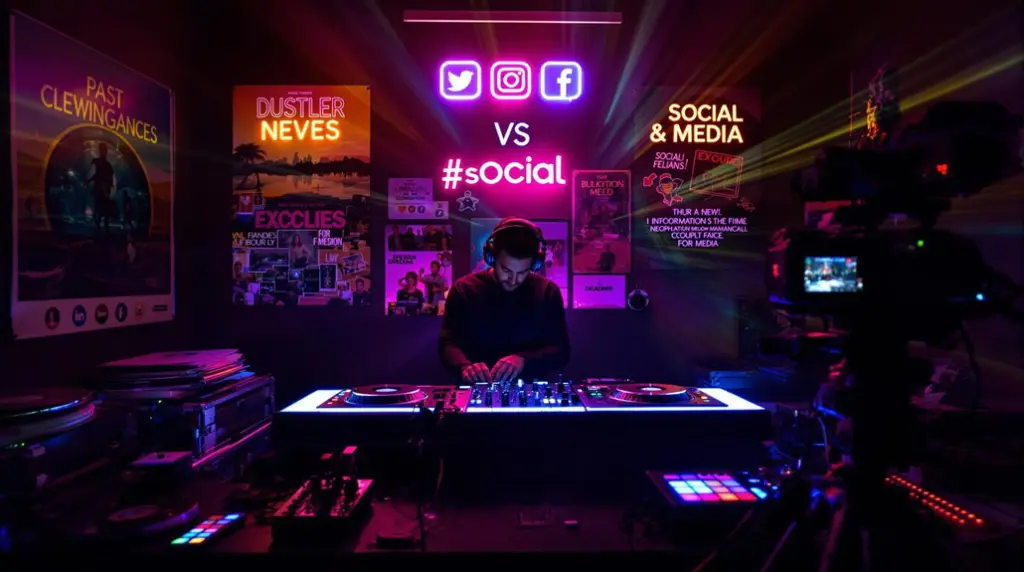Beginner DJs often stumble over key issues: using low-quality tracks undermines set integrity, so sourcing from reputable platforms like Beatport is essential. Ignoring music theory can lead to disjointed changes and energy drops; understanding phrasing and harmonic mixing is critical. Overusing effects can clutter your set; moderation enhances performance quality. Choosing the right learning method is imperative; structured courses surpass inconsistent YouTube tutorials. Finally, neglecting community engagement limits growth and opportunities; participating in local events and DJ groups cultivates valuable connections and experience. Gaining deeper insights into these areas will greatly enhance your DJing skills and audience connection.
Key Takeaways
- Using Low-Quality Tracks: Always source high-quality tracks from reputable platforms to maintain set integrity and audience engagement.
- Ignoring Music Theory: Learn music theory, especially phrasing and harmonic mixing, to ensure seamless transitions and a cohesive set.
- Overusing DJ Effects: Use effects sparingly to enhance tracks without disrupting flow; prioritize smooth transitions.
- Inadequate Learning Methods: Opt for structured courses over random YouTube tutorials to build a strong foundational skill set.
- Lack of Community Engagement: Engage with local and online DJ communities to gain mentorship, practical experience, and exposure to diverse techniques.
Using Low-Quality Tracks
One common pitfall for beginner DJs is the use of low-quality tracks, which can greatly undermine the integrity of their sets. Relying on tracks sourced from platforms like YouTube often results in inconsistent BPMs and mastering issues, which can disrupt the seamless flow essential for engaging a dance floor.
These low-quality tracks frequently suffer from poor sound quality, detracting from the overall auditory experience and diminishing audience engagement. Additionally, failing to explore new music regularly can lead to a stale and uninspired setlist, making it challenging to maintain vibrancy and audience interest.
To avoid these issues, novice DJs should prioritize track sourcing from reputable DJ-focused platforms such as Beatport or DJ pools. These sources provide high-quality tracks, including full club edits and original mixes, which are vital for smooth changes and maintaining the set’s energy.
Unlike short radio edits, which may lack essential build-ups and breakdowns, these professional tracks are tailored for DJ use, enhancing the mixing experience.
Investing in high-quality tracks not only guarantees superior sound quality but also reflects a commitment to professionalism. By focusing on quality when building a set, DJs can create a more engaging and polished performance, establishing a stronger connection with their audience and elevating their craft.
Ignoring Music Theory
A fundamental misstep for many beginner DJs is the neglect of music theory, a discipline that underpins the art of seamless mixing and maintaining dance floor energy. A solid grasp of music theory, including phrasing and song structure, guarantees smooth shifts and energy continuity. Beginners often overlook harmonic mixing, which can lead to disjointed sets. By understanding key relationships, DJs can enhance musical flow and avoid jarring changes.
One vital aspect is tempo consistency. Mixing tracks with inconsistent BPMs can disrupt the audience’s experience. A thorough understanding of tempo and rhythm helps maintain a cohesive set. Regular practice and exercises in music theory can refine a DJ’s skills, making shifts more intuitive and less dependent on chance.
Additionally, music theory knowledge enables DJs to creatively mix across genres while preserving set energy, avoiding genre clashes. Ignoring this can result in a set that feels fragmented and disorganized.
| Aspect | Importance | Benefit |
|---|---|---|
| Phrasing & Structure | Guarantees smooth shifts | Maintains dance floor energy |
| Harmonic Mixing | Enhances musical flow | Avoids disjointed sets |
| Tempo Consistency | Critical for cohesive mixing | Prevents disruption of audience’s experience |
Understanding and applying music theory is not optional—it is essential for any DJ aspiring to deliver an engaging performance.
Overusing DJ Effects
Many beginner DJs fall into the trap of overusing effects such as spin backs and filters, which can ultimately detract from the overall experience. While these effects can add flair and creativity to a set, their excessive use often results in cluttered shifts that disrupt the flow of music.
Effect moderation is paramount; overloading a set with effects can annoy the audience and overshadow the original track’s essence.
To enhance the audience’s experience, DJs should prioritize shift focus. This means mastering smooth, seamless shifts before incorporating any effects.
Real-time effects manipulation can greatly enhance live performance creativity when used thoughtfully. Effects should be the final touch—the icing on the cake—rather than the main feature. When used sparingly and thoughtfully, effects can boost the energy and dynamic of a set without compromising its integrity.
Practice and a keen understanding of timing are essential for integrating effects effectively. Knowing when to apply an effect for maximum impact guarantees the flow and energy of the set remain consistent.
Inadequate Learning Methods
While mastering the art of effect moderation is a significant milestone for beginner DJs, the journey toward becoming a proficient DJ often encounters another substantial hurdle: inadequate learning methods. Many beginners rely heavily on YouTube tutorials, which, though accessible, often lack structured learning paths. This reliance on ineffective tutorials can lead to confusion and inefficient skill acquisition, as these resources frequently skip foundational elements essential for long-term success.
Additionally, beginners may struggle with choosing the right DJ software, such as Serato DJ Lite or Virtual DJ, without proper guidance. Self-taught DJs frequently display significant knowledge gaps compared to their peers who underwent formal training. These gaps can result in average skill levels that impede progress.
Quality instruction is paramount; not all experienced DJs possess the pedagogy required to be effective instructors. A poor teaching methodology can severely impact a learner’s outcomes, creating a shaky foundation.
Structured courses, on the other hand, offer thorough and organized learning paths, ensuring that foundational skills are progressively and effectively built. These courses typically cover all major music genres and incorporate both technical skills and creativity, fostering a well-rounded approach.
Beginners should prioritize learning methods that provide a holistic education, avoiding unstructured practice that leads to fragmented knowledge and stunted growth.
Lack of Community Engagement
Engaging with the DJ community is an often overlooked yet essential aspect of a beginner DJ’s development. Many novices miss out on important networking opportunities, mentorship, and constructive feedback by failing to actively participate in their local or online DJ circles. This lack of community involvement can result in feelings of isolation and greatly hinder a DJ’s growth. The collaborative support from peers is indispensable for learning and mastering the craft.
Joining local or online DJ groups offers beginners invaluable access to resources, tips, and experiences shared by more seasoned DJs. These platforms foster a nurturing environment that can accelerate skill development and provide much-needed encouragement. Networking opportunities within these communities can also lead to potential gigs, collaborations, and exposure in the industry.
Additionally, attending local DJ events frequently builds trust and rapport with peers, which is vital for overcoming career challenges.
Participating in community events, such as open decks or DJ competitions, can be particularly beneficial. These events allow beginners to gain practical experience, build confidence, and receive constructive criticism from fellow DJs.
Furthermore, engaging with a supportive community not only motivates beginners to persist in their learning journey but also exposes them to diverse musical styles and techniques, enriching their own DJing approach. Essentially, community engagement is a cornerstone for any aspiring DJ’s success.
Frequently Asked Questions
What Should a Beginner DJ Do?
A beginner DJ should prioritize a well-curated music selection from reputable sources and establish a consistent practice routine. This approach guarantees better mixing consistency, smoother changes, and maintains the energy flow, contributing to a successful performance.
What Problems Do DJS Face?
DJs frequently encounter equipment issues, technical difficulties, and challenges with sound quality. Furthermore, effective crowd engagement, ideal music selection, and efficient time management are essential to maintaining a dynamic and seamless performance.
What Makes You Stand Out as a DJ?
Standing out as a DJ involves cultivating a unique style and establishing a strong audience connection. By curating high-quality tracks, mastering harmonic mixing, and dynamically engaging the crowd, one can create memorable, high-energy experiences that resonate deeply.
How Do I Get Really Good at DJ?
To excel as a DJ, master advanced mixing techniques and prioritize high-quality track selection. Engage in formal DJ courses, practice consistently, and immerse yourself in a supportive community to refine your skills and enhance your artistry.
Conclusion
In conclusion, novice DJs often falter by employing low-quality tracks, neglecting fundamental music theory, overutilizing DJ effects, adopting inadequate learning methods, and failing to engage with the community. To achieve proficiency and success in the field, it is essential to invest in high-quality music, understand and apply music theory, use effects judiciously, adopt effective learning strategies, and actively participate in the DJ community. Addressing these common pitfalls will greatly enhance a DJ’s skill set and career prospects.




